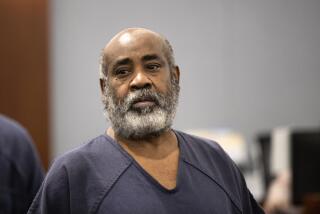Sides rest in racial bias case against studio
A federal judge will now determine whether Universal Pictures discriminated against an African American assistant director when it fired him from the film “2 Fast 2 Furious.” The decision could come within days.
With the conclusion of closing arguments Wednesday, U.S. District Judge Gary Allen Feess will weigh the Equal Employment Opportunity Commission’s contention that Frank Davis was unjustly terminated, the first racial discrimination case the agency has filed against a Hollywood studio.
Universal denies the allegations, arguing that Davis was replaced because he wasn’t up to the job.
During closing arguments, Feess repeatedly peppered the EEOC’s attorney, Derek Li, with questions on what evidence there was showing race played a role in Davis’ firing.
“A number of people involved in this picture described with a fair amount of specificity problems they encountered” with Davis, said Feess during Li’s closing argument. “Are they all racially biased?”
The government agency, which filed its case four years ago on behalf of Davis, acknowledged that racial discrimination cases were hard to prove and depended on circumstantial evidence. The burden is on the agency to prove that the reasons Universal gave for Davis’ firing were not true and therefore race played a role in the termination.
“This case is about fair opportunity,” Li said. “He was not given the opportunity to succeed or fail on his merits.... Circumstantial evidence shows that the reasons given about his performance were false” and that his white colleagues “were treated differently.”
The EEOC is seeking court-enforced monitoring and oversight of the studio’s hiring and firing practices.
Universal’s outside counsel, Steve Cochran, said in his closing argument that the government had smeared the studio’s name.
“Racial bigotry is cruel, despicable and unacceptable behavior,” Cochran said. “Even worse is what the government has done to the good people of Universal.”
Davis last week settled his personal claim with Universal for an undisclosed amount.
Last week, “2 Fast 2 Furious” director John Singleton, an Oscar-nominated African American filmmaker, testified that although he was opposed to Davis’ firing, he ultimately agreed to it in order to make his movie.
“He had a movie and he had to get it done and if it meant throwing Frank Davis under the bus, he would do it,” Feess said Wednesday during Li’s closing argument.
Allegations of race were brought up in the trial by a representative of the Directors Guild of America, who said Singleton told him that race was a factor in Davis’ firing.
In addition, a producer, Matthew Weiner, alleged that the movie’s unit production manager, Terry Miller, asked him in a telephone interview whether he was black. On the stand, however, Miller denied saying that to Weiner, and Feess said he believed Miller to be a credible witness. Miller had also hired Davis on a previous production, “Terminator 2: Judgment Day.”
Arguing that Davis was not given a fair shot, the EEOC used an e-mail sent by studio executives weeks before filming began that stated the production team did not think it would be easy to replace Davis because they did not have “real specifics for getting rid of him.”
On Wednesday, Feess asked Universal’s attorney whether he thought that was a “fair way to treat somebody.”
Although Cochran acknowledged it was not, he said Universal executives were under tremendous pressure to put a complicated movie together in a short amount of time for less than $90 million and that Davis did not seem in command.
The first assistant director must work closely with the director, the producers and the crew to keep the schedule on time and keep the set safe.
“They kept hearing, ‘if you don’t make a change here something bad could happen,’ ” Cochran said.
--
More to Read
The biggest entertainment stories
Get our big stories about Hollywood, film, television, music, arts, culture and more right in your inbox as soon as they publish.
You may occasionally receive promotional content from the Los Angeles Times.










